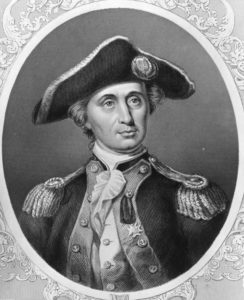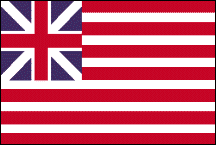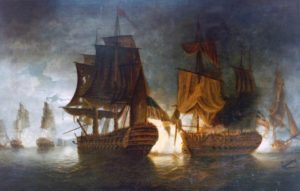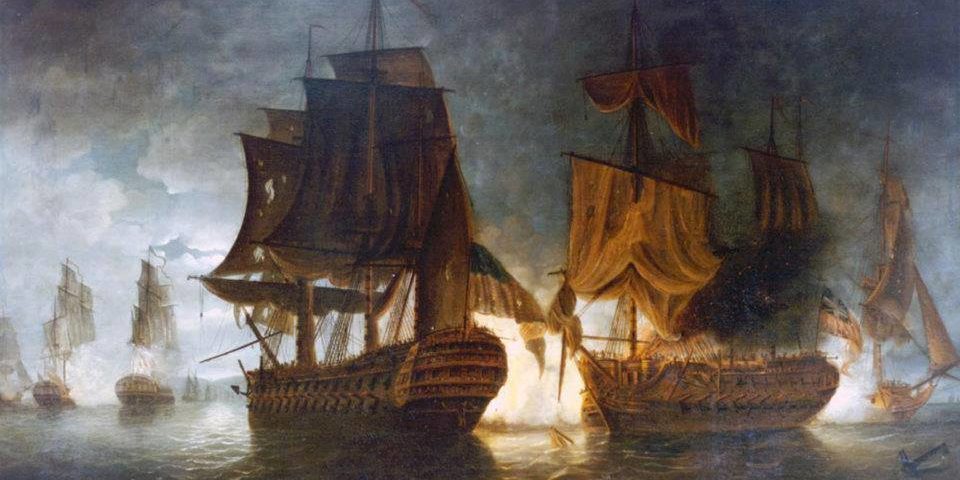 John Paul Jones, known as the “father of the U.S. Navy”, was born under the name John Paul in Scotland on July 6, 1747. His fame came from the amazing battle on September 23, 1779 where he defeated the British warship Serapis against all odds in a display of Providence and valor. At 13 years of age he found his initial calling at sea, earning an apprenticeship with the British Merchant Marine. Adventures at sea brought him to America where he got involved in the slave trade, but thankfully, was repulsed by it and returned to shipping real cargo instead. How he came to fight for the Colonies in the Revolution is “the rest of the story.”
John Paul Jones, known as the “father of the U.S. Navy”, was born under the name John Paul in Scotland on July 6, 1747. His fame came from the amazing battle on September 23, 1779 where he defeated the British warship Serapis against all odds in a display of Providence and valor. At 13 years of age he found his initial calling at sea, earning an apprenticeship with the British Merchant Marine. Adventures at sea brought him to America where he got involved in the slave trade, but thankfully, was repulsed by it and returned to shipping real cargo instead. How he came to fight for the Colonies in the Revolution is “the rest of the story.”
 In 1773, when John Paul was 26, he was caught in a difficult situation where he had to kill a mutinous sailor on the island of Tobago in self-defense. Though he was justified, he believed he would not get a fair trial and thus fled to Fredericksburg, Virginia adding “Jones” to his name to conceal his identity. Britain’s cruel treatment of the Scots caused him to side with the colonies in their quest for liberty. In 1775 he joined the new Continental Navy which had begun with George Washington’s personal financing of seven vessels (the Hannah, Franklin, Hancock, Lynch, Washington, Lee and Harrison) under the Appeal to Heaven flag. Washington also had some floating batteries built on the Charles River to help wreak havoc on the British fleet in late 1775.
In 1773, when John Paul was 26, he was caught in a difficult situation where he had to kill a mutinous sailor on the island of Tobago in self-defense. Though he was justified, he believed he would not get a fair trial and thus fled to Fredericksburg, Virginia adding “Jones” to his name to conceal his identity. Britain’s cruel treatment of the Scots caused him to side with the colonies in their quest for liberty. In 1775 he joined the new Continental Navy which had begun with George Washington’s personal financing of seven vessels (the Hannah, Franklin, Hancock, Lynch, Washington, Lee and Harrison) under the Appeal to Heaven flag. Washington also had some floating batteries built on the Charles River to help wreak havoc on the British fleet in late 1775.
 John Paul Jones began his career in defense of liberty aboard the Alfred in February of 1776. He was the first to raise the Grand Union Flag and was sent to Nassau in the Bahama’s to raid it for supplies. He was appointed next to command the sloop Providence where in six weeks he captured 16 prizes and caused considerable damage in Nova Scotia. In late 1776 he commanded the Alfred to liberate prisoners from Nova Scotia and he also captured another British ship.
John Paul Jones began his career in defense of liberty aboard the Alfred in February of 1776. He was the first to raise the Grand Union Flag and was sent to Nassau in the Bahama’s to raid it for supplies. He was appointed next to command the sloop Providence where in six weeks he captured 16 prizes and caused considerable damage in Nova Scotia. In late 1776 he commanded the Alfred to liberate prisoners from Nova Scotia and he also captured another British ship.
 Soon Jones was able to procure a commission as lieutenant in the small Continental Navy. He was given command of the Sloop-of-War Ranger, a war ship with a single deck of 18 guns. Built in Portsmouth, New Hampshire, in 1777 she captured the first British warship of the Revolution, the Drake, in 1778. The Ranger also became the first ship saluted by another country (France) during the Revolution.
Soon Jones was able to procure a commission as lieutenant in the small Continental Navy. He was given command of the Sloop-of-War Ranger, a war ship with a single deck of 18 guns. Built in Portsmouth, New Hampshire, in 1777 she captured the first British warship of the Revolution, the Drake, in 1778. The Ranger also became the first ship saluted by another country (France) during the Revolution.
On April 23, 1778 he accomplished the only invasion of England (at the coastal town of Whitehaven) during the Revolution! Furthermore, it was the only time England had been invaded in 700 years! His plan was to set the 400 merchant ships in the harbor on fire but only one was actually lit and the townspeople put it out. Due to a lack of discipline among his sailors, little damage was done. However, the attack caused alarm to Britain, forcing her to spend valuable resources increasing its defense at home rather than spend those resources to defeat her colonies on the eastern seaboard of America. Jones became known as a one-man wrecking crew, capturing the Drake and wreaking more havoc by interrupting the British fleet at every turn.
In 1779 Jones was given command of the Bonhome Richard (named after Ben Franklin). It had 42 guns and was a converted merchant ship. On August 14 he set sail with a five ship squadron with two privateers in order to raid the Irish Sea and disrupt British Naval shipping. He was chased around the tip of Scotland and all down the English seacoast, causing quite an alarm. On September 23 he met with a large British convoy, led by the HMS Serapis, a 50 gun frigate. It was this battle, more than any other, that gave Jones his fame. It was the battle of Flamborough Head, off the East coast of England.
 The escorts of the Serapis put themselves inbetween Jones and their merchant ships to allow them to escape. Soon the Richard engaged in a broadside battle with the Serapis. During the second broadside, two of the Richard’s cannons burst, putting the rest of his guns on the lower deck out of commission. Though the Serapis wanted to gain enough distance to continue to rake her sides, the Richard rammed her in the stern, and Jones ordered his men to lash the two ships together, rendering the guns useless.
The escorts of the Serapis put themselves inbetween Jones and their merchant ships to allow them to escape. Soon the Richard engaged in a broadside battle with the Serapis. During the second broadside, two of the Richard’s cannons burst, putting the rest of his guns on the lower deck out of commission. Though the Serapis wanted to gain enough distance to continue to rake her sides, the Richard rammed her in the stern, and Jones ordered his men to lash the two ships together, rendering the guns useless.
Once the ships were tied together, after having been in battle several hours already, a fierce two hour hand to hand combat ensued as Jones’ men rushed on to the Serapis. When the American ensign was shot away, British Captain Pearson said, “Jones, do you ask for quarter?” or in other words – do you want to surrender? The famous line from John Paul Jones was his response – “I have not yet begun to fight!” The fighting continued with nine pound cannon and small arms as the ships and men were caught in a death trap. Huge holes were blown through the hull of the Richard, but when an American grenade fell through the hatchway of the Serapis, it ignited the powder charges, killing dozens of British soldiers. As his mainmast began to quiver, Pearson struck his colors and surrendered!
 Two days later the Richard sunk, and Jones transferred his flag, surviving crew and British prisoners on to the Serapis and along with the other escorts that had been with the Jones, sailed to neutral Holland. Each side suffered 70 to 80 casualties and an equal number of wounded. The victory by John Paul Jones against incredible odds and his response inspired both the Americans and French, who aided them, the rest of the war. May we learn a critical lesson from this story, though it is 240 years ago.
Two days later the Richard sunk, and Jones transferred his flag, surviving crew and British prisoners on to the Serapis and along with the other escorts that had been with the Jones, sailed to neutral Holland. Each side suffered 70 to 80 casualties and an equal number of wounded. The victory by John Paul Jones against incredible odds and his response inspired both the Americans and French, who aided them, the rest of the war. May we learn a critical lesson from this story, though it is 240 years ago.
Though not in mortal combat, the Pilgrims had to face, as Bradford put it, “The grim and grisly face of poverty coming upon them like an armed man, with whom they must buckle and encounter, and from whom they could not fly. But they were armed with faith and patience against him and all his encounters; and though they were sometimes foiled, yet by God’s assistance they prevailed and got the victory.” When the Pilgrims fled to Holland, they faced difficulty, and at every turn, from their voyage (where they lost the Speedwell, the only ship they owned) to the first winter where half their number died, they could easily have given up, but when asked to surrender, they had yet begun to fight!
So it is today. The odds appear to be against those who cling to their Bible, faith and their Lord, and yet, like John Paul Jones of old, when we are asked, both directly and through circumstances, to surrender and give up the fight, must we “Surrender? We have not yet begun to fight!” Like the Pilgrims of old, our fight is spiritual, primarily, with faith and patience. Endurance comes through faithfulness, and the believer and American who knows the story of the heroes of the past will gain strength by taking heed to the Scriptures as written in 1st Timothy 6:12 – “Fight the good fight of faith, lay hold on eternal life, to which you were also called and have confessed the good confession in the presence of many witnesses.”







